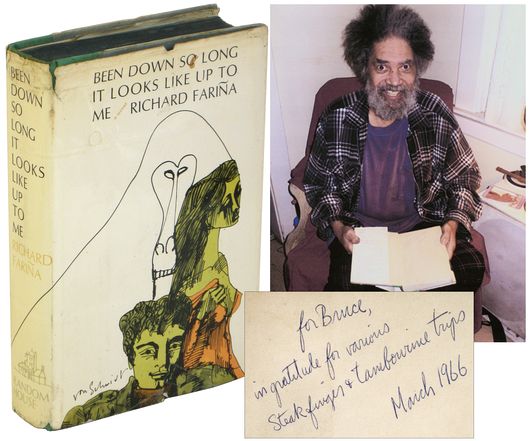
FARIÑA, Richard
Been Down So Long It Looks Like Up to Me
New York, Random House, (1966). Fariña's first and only novel, one of the key novels of the 1960s counterculture, and the only book of Fariña's to be published while he was alive. This copy is inscribed by the author to Bruce Langhorne, his longtime friend, session musician on all three of his albums, and the inspiration for Bob Dylan's song "Mr. Tambourine Man": "For Bruce,/ In gratitude for various/ steak finger & tambourine trips / March 1966." Fariña died in a motorcycle accident shortly after his novel was published in April 1966, and signed copies are thus extremely scarce. The date of this inscription is the month prior to publication, meaning this was probably one of the author's copies. A superb association copy, which embodies in its association of individuals a history of its era. Bruce Langhorne was a highly regarded musician in the folk scene in New York in the early 1960s. He played with many artists and his various gigs show how small and close-knit the folk music community was then. Langhorne played guitar on a 1961 album by folk singer Carolyn Hester, who was Richard Fariña's first wife. Bob Dylan's first recording gig was on that album, playing harmonica as a session musician. Langhorne and Dylan became friends and Langhorne later characterized their musical relationship as "telepathic": they each understood the other, without explanation. Langhorne played on a single Dylan recorded in 1962, and they worked so well together he later played guitar on all of the major songs on Dylan's breakthrough album "Freewheelin'" in 1963. He also played guitar, both acoustic and electric, on "Bringin' It All Back Home," Dylan's landmark album which marked his transition from folk to rock, and the album on which he recorded "Mr. Tambourine Man." In later years Dylan recounted being inspired by seeing Langhorne playing a large Turkish frame drum -- as large as a wagon wheel, with Langhorne playing it like a tambourine -- an image Dylan said he never forgot. Langhorne's drum was included in the Dylan exhibition "Bob Dylan's American Journey, 1956-1966" in 2004-5. Dylan and Fariña were both friends and rivals, each trying to make it as a folk singer, each hooked up with one of the Baez sisters, both trying to make their mark. Dylan's song "Positively Fourth Street," which famously begins "You've got a lot of nerve to say you are my friend; when I was down you just stood their grinning," is supposed to have been written about Fariña; yet at the same time, the two played a gig together at London's Troubadour club in 1963. Fariña's other close artistic friendship/competition at the time was with Thomas Pynchon, a friend from his days at Cornell and, like Fariña, an aspiring writer. Pynchon's first novel was published in 1963, thus beating Fariña, and Pynchon became Fariña's literary mentor -- someone who had succeeded in getting his writing published. Pynchon advised Fariña on the manuscript while it was in progress, and he has a blurb on the dust jacket of the published book. At around this time, according to Carolyn Hester, Fariña was helping Dylan get a book of poems published. The closeness of these relationships -- with Fariña at the center -- raises the question of whether Pynchon and Dylan had any influence on each other's writings. Each made a dramatic breakthrough in 1963, changing their respective fields dramatically, in ways that others would be emulating for decades. At the center of this triptych is Fariña; and weaving through Fariña's life as a folksinger until just before his death, was Bruce Langhorne -- Fariña's friend and musical mentor, Dylan's telepathic accompanist and inspiration. We know of no such association copy of this book ever turning up before: only Dylan's or Pynchon's copies would be more evocative. A spectacular association copy, indicative of the closeness of the two, and a key artifact of its era. With a letter of provenance from Bruce Langhorne.
[#027891]
SOLD
All books are first printings of first editions or first American editions unless otherwise noted.